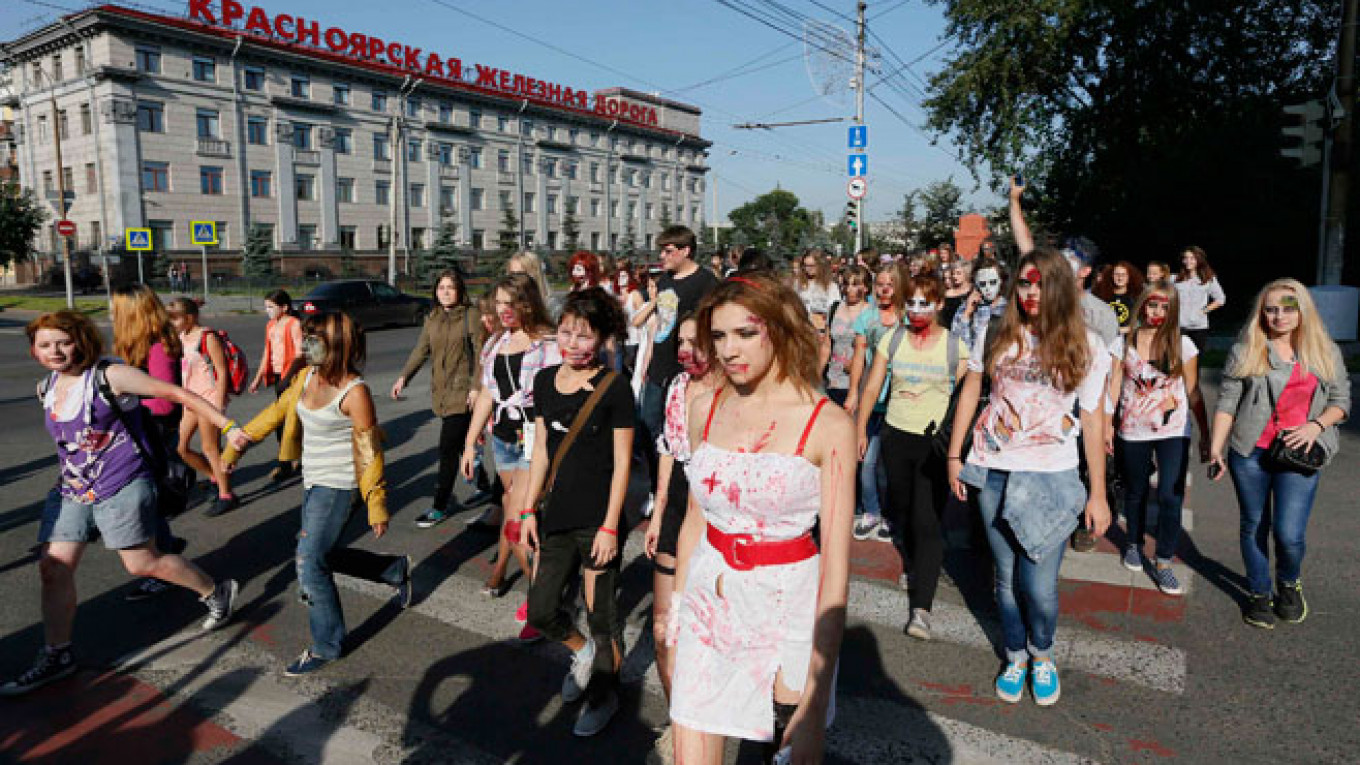Зомбирование: zombification
Here at The Moscow Times language desk we aim to keep our readers informed about the most up-to-date Russian language trends. So imagine our dismay when we realized we hadn't written about зомбирование (zombification), which is surely one of the top words of 2014.
Зомбирование is the process of making зомби (zombie/zombies). One dictionary defines the process this way: упрощение роли и функций души, духа в человеческой жизнедеятельности (reducing the role and function of the soul and spirit in human vital activities).
Not surprisingly to anyone who has worked in an office, зомбирование is used to describe what happens in the corporate workplace. Here's a description of a place I think I once worked at: Работники расползаются домой, менеджеры ходят как зомби, с полузакрытыми глазами, натыкаясь на столы, охрана же при виде этих привидений сочувствующе улыбается (Employees crawl away home as the managers move like zombies with half-closed eyes, walking into desks, while the security guys smile sympathetically at these apparitions).
Зомбирование is also used to describe anyone who is out of it: После сообщения о приостановке деятельности компании из кабинета выплыли два десятка зомби (After the announcement that the company was ceasing operations, two dozen people filed out of the office like zombies).
But зомбирование is used in less expected ways: Лжеправославными старцами Оптиной пустыни были зомбированы Н.В. Гоголь, Ф.М. Достоевский и другие русские интеллектуалы (Nikolai Gogol, Fyodor Dostoevsky and other Russian intellectuals were zombified by the pseudo Orthodox spiritual fathers at the Optina Monstery). And it can also be used in more moving ways: Чеченская женщина сегодня действительно зомби ― она зомбирована многолетним непрекращающимся горем (Today the women of Chechnya are truly zombies; they have been turned into zombies by many years of unceasing grief).
For a long time зомбирование has been used to describe the result of propaganda. Take this quote from 2003: О том, что нас всех зомбируют пропагандой, мы читаем и слышим вот уже второе десятилетие (We have been reading and hearing for more two decades that we are all being turned into zombies by propaganda).
Today it is the standard word used to describe why someone has a completely different understanding of the war in Ukraine. Западное общество зомбировано своими «независимыми СМИ» (Western society has been turned into zombies by their so-called independent media). Идёт зомбирование зрителей российским ТВ (Viewers are being turned into zombies by Russian television).
As one writer notes: Телевизор вполне справедливо называют зомбоящиком (The television is called the zombie-box for very good reason). The reason is this: отупляющее действие телевизионных программ, используемых властями для промывания мозгов населению в целях создания определённого, нужного им общественного мнения (the stupefying effect of television programs used by the authorities to brainwash the population in order to create the specific public opinion that they need).
Television as a brainwashing machine is also called зомбификатор (zombifier) or зомбивизор (zombivision). And some folks think the effect is catastrophic: Коллективному зомбированию подвержены 95 процентов населения. (Ninety five percent of the population is subject to collective zombification).
Time to get off the couch.
Michele A. Berdy, a Moscow-based translator and interpreter, is author of "The Russian Word's Worth" (Glas), a collection of her columns.
A Message from The Moscow Times:
Dear readers,
We are facing unprecedented challenges. Russia's Prosecutor General's Office has designated The Moscow Times as an "undesirable" organization, criminalizing our work and putting our staff at risk of prosecution. This follows our earlier unjust labeling as a "foreign agent."
These actions are direct attempts to silence independent journalism in Russia. The authorities claim our work "discredits the decisions of the Russian leadership." We see things differently: we strive to provide accurate, unbiased reporting on Russia.
We, the journalists of The Moscow Times, refuse to be silenced. But to continue our work, we need your help.
Your support, no matter how small, makes a world of difference. If you can, please support us monthly starting from just $2. It's quick to set up, and every contribution makes a significant impact.
By supporting The Moscow Times, you're defending open, independent journalism in the face of repression. Thank you for standing with us.
Remind me later.








